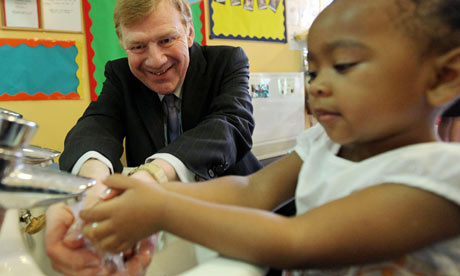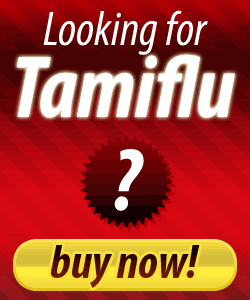
Healthy children aged between six months and five years old will be vaccinated against swine flu from next month, the Department of Health has confirmed.
The expansion of the government's inoculation programme comes as the latest pandemic bulletin reported a sharp rise in the number of children being admitted to hospital and a further surge in patient deaths.
The overall estimate of swine flu cases, however, showed a second successive weekly fall. Health officials estimate there were 55,000 new cases this week in England compared with 64,000 last week. There was also a dip in cases in Scotland. The decline could still be a temporary consequence of warm weather or half-term: pupils have been one of the main transmission routes.
The number of people who have died from swine flu in the UK has risen to 215, with 18 deaths in England alone last week. The figures since the start of the outbreak in May now stand at 142 fatalities in England, 21 in Wales, 39 in Scotland and 13 in Northern Ireland. Among the latest confirmed deaths was that of a five-year-old schoolgirl from Slough, Berkshire.
The number of people needing hospital care for the virus is 783, down slightly from 785 in the previous week. Of those in hospital, 180 were in intensive care - up from 173 the previous week.
The decision to include young children in the next phase of the inoculation programme comes as evidence accumulates demonstrating their vulnerability to the H1N1 virus. Around 21% of all H1N1 deaths in the UK have been among the under-14s. More than 80% of the under-fives who ended up in hospital had no previous health problems.
The existing vaccine priority groups include those with pre-existing medical conditions, their carers and pregnant women. Youngsters with asthma or diabetes, for example, are already being vaccinated. The additional categories will raise the target numbers for priority vaccine groups from 14 million to approaching 20 million. GPs are expected to begin offering the vaccine to healthy young children before Christmas even if they have not inoculated all their patients in other priority groups.
The chief medical officer, Sir Liam Donaldson, said: "Protecting those most at risk from the disease will reduce the levels of serious illness, and deaths. That's why we will shortly offer the vaccine to young children.
"Vaccination remains a personal choice, but I urge everyone who is offered the vaccine to accept it and protect themselves. While the risks of serious complications from flu may be small, the impact on those affected can be devastating."
Professor Terence Stephenson, president of the Royal College of Paediatrics and Child Health, said: "[We] strongly recommend that parents should get their children vaccinated if they are offered the vaccine. We would like to emphasise the importance of children's doctors and nurses being vaccinated too, not least to prevent passing the infection on to their patients who may be vulnerable children with serious diseases."
Andrew Lansley, the Conservative health spokesman who has urged the government to vaccinate healthy children, said: "This is in line with emerging evidence that they are one of the groups with the highest rates of hospitalisation, which is putting a real strain on the NHS."
Around 715,000 people are estimated to have caught the infection. Nearly two-thirds of those who have died in the UK have been under the age of 44.
The Medicines and Healthcare Regulatory Agency (MHRA) yesterday released further details of reported adverse reactions to vaccines and anti-viral drugs prescribed for swine flu. It said that no safety concerns had emerged. Eight deaths had been reported among patients who took Tamiflu but: "These cases have been fully evaluated and in none of these is there evidence to confirm that Tamiflu was directly responsible for the fatal event. Underlying medical conditions and/or concurrent infection provide a more plausible alternative explanation for the events."
The expansion of the government's inoculation programme comes as the latest pandemic bulletin reported a sharp rise in the number of children being admitted to hospital and a further surge in patient deaths.
The overall estimate of swine flu cases, however, showed a second successive weekly fall. Health officials estimate there were 55,000 new cases this week in England compared with 64,000 last week. There was also a dip in cases in Scotland. The decline could still be a temporary consequence of warm weather or half-term: pupils have been one of the main transmission routes.
The number of people who have died from swine flu in the UK has risen to 215, with 18 deaths in England alone last week. The figures since the start of the outbreak in May now stand at 142 fatalities in England, 21 in Wales, 39 in Scotland and 13 in Northern Ireland. Among the latest confirmed deaths was that of a five-year-old schoolgirl from Slough, Berkshire.
The number of people needing hospital care for the virus is 783, down slightly from 785 in the previous week. Of those in hospital, 180 were in intensive care - up from 173 the previous week.
The decision to include young children in the next phase of the inoculation programme comes as evidence accumulates demonstrating their vulnerability to the H1N1 virus. Around 21% of all H1N1 deaths in the UK have been among the under-14s. More than 80% of the under-fives who ended up in hospital had no previous health problems.
The existing vaccine priority groups include those with pre-existing medical conditions, their carers and pregnant women. Youngsters with asthma or diabetes, for example, are already being vaccinated. The additional categories will raise the target numbers for priority vaccine groups from 14 million to approaching 20 million. GPs are expected to begin offering the vaccine to healthy young children before Christmas even if they have not inoculated all their patients in other priority groups.
The chief medical officer, Sir Liam Donaldson, said: "Protecting those most at risk from the disease will reduce the levels of serious illness, and deaths. That's why we will shortly offer the vaccine to young children.
"Vaccination remains a personal choice, but I urge everyone who is offered the vaccine to accept it and protect themselves. While the risks of serious complications from flu may be small, the impact on those affected can be devastating."
Professor Terence Stephenson, president of the Royal College of Paediatrics and Child Health, said: "[We] strongly recommend that parents should get their children vaccinated if they are offered the vaccine. We would like to emphasise the importance of children's doctors and nurses being vaccinated too, not least to prevent passing the infection on to their patients who may be vulnerable children with serious diseases."
Andrew Lansley, the Conservative health spokesman who has urged the government to vaccinate healthy children, said: "This is in line with emerging evidence that they are one of the groups with the highest rates of hospitalisation, which is putting a real strain on the NHS."
Around 715,000 people are estimated to have caught the infection. Nearly two-thirds of those who have died in the UK have been under the age of 44.
The Medicines and Healthcare Regulatory Agency (MHRA) yesterday released further details of reported adverse reactions to vaccines and anti-viral drugs prescribed for swine flu. It said that no safety concerns had emerged. Eight deaths had been reported among patients who took Tamiflu but: "These cases have been fully evaluated and in none of these is there evidence to confirm that Tamiflu was directly responsible for the fatal event. Underlying medical conditions and/or concurrent infection provide a more plausible alternative explanation for the events."




No comments:
Post a Comment
Note: Only a member of this blog may post a comment.